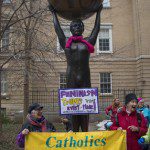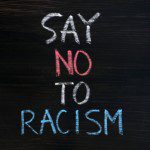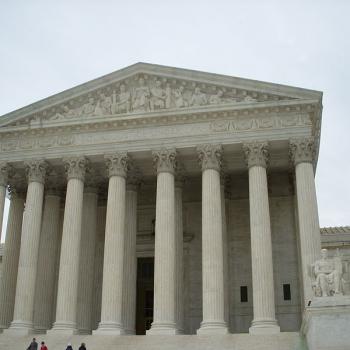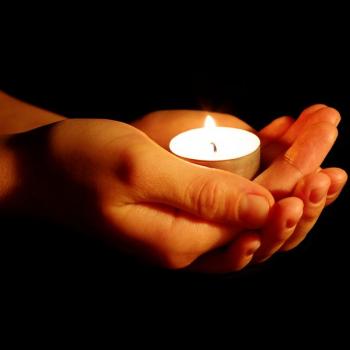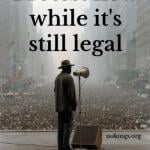
The threat of autocracy
Living in Trump’s America poses unprecedented threats to the fabric of our democracy. While the Civil War tested our strength as a federation of states; Trump’s presidency will test our strength as a republic. A republic is distinctly democratic form of government with an elected president rather than a monarch. Clearly, Trump’s narcissistic tendencies and his consolidation of power threaten to veer toward autocracy rather than democracy.
While true that Trump won the electoral college, and thus the election, he did not win the popular vote. What intrigues and concerns me is the number of people who did vote for him. His election is a result of deeper tensions and divisions in our country. Divisions that bear considered attention for all people of good will – Trump, Clinton, Johnson, and Stein voters alike. Christian churches and particularly white Christians, need to be tending these tensions most particularly.
Making sense of what’s happening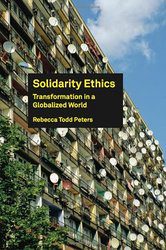
For the next six weeks, I am co-leading an anti-racism series for six white churches in my community. We will be discerning how God is calling us to tend to the tensions that threaten our country. Using my book, Solidarity Ethics, we will also be learning how to practice solidarity.
It is clear is that our country has been divided over a host of issues for a long time. From race and class to homosexuality and fear of transgender people. From immigration and poverty to the role of women and men in society. The recent election brought these divisions into stark relief. I am not interested in bashing Trump. Hopefully there are people who voted for Trump who will read this blog post. But as a Christian, as a feminist, as a reasoning and rational person – I am interested in the rhetoric of hatred, division, anti-intellectualism, misogyny, and race-baiting that he uses.
I was not stunned that my candidate lost – I have lived long enough to see my candidates lose before. I was stunned that 58% of Christians voted for a man who bragged that he could sexually assault women because he was famous. I was stunned that 81% of white evangelical or born-again Christians voted for a man who said he never asked God for forgiveness because he didn’t need to.
Racism in America
The radical divide that separates our country is real and it is threatening to tear our country apart. While there are many problems that underlie these tensions, one very real divide is the divide over race. A tension that has shaped the United States since Europeans first landed on the shores of the Americas.
We live in a society shaped and formed by a history of racism so deep and long that it traces back to the very foundations of American society. From our shameful history of genocide of Native Americans through massacres, blankets filled with small pox and forced relocations like the Trail of Tears. To centuries of chattel slavery that built the wealth of this nation to the racist realities of the Chinese Exclusion Act and the World War II Internment Camps where we imprisoned Japanese American citizens. Racism is a sin that runs deeply through the history of our country.
It is difficult to talk about these issues with white Christians in this country in open and honest ways. Most white Christians are good people who do not understand themselves to be prejudice. That’s one of the insidious things about prejudice – it is invisible to those who hold it. It is hard to talk about these things because we haven’t learned how to talk about privilege or race in productive and meaningful ways rather than in ways that shame and blame us.
White churches stepping up
Increasingly, white Christians in this country are talking about race, prejudice, oppression and whiteness. It is important and a necessary first step for white people to learn to see the world in new ways. Ways that allow us to both see our privilege and how it is born on the backs of people labeled as “not white.” Over the next six weeks, our class will be talking about privilege and race. Not in ways that shame or blame, but in ways that teach us how to critically examine how the structures of our society have formed a world that has institutionalized racism in our country. We will talk about the ideas of “white supremacy” and “xenophobia” and how these concepts shape our history. We will ask if they apply to what is happening in our country today even as Trump is closing our borders.
The goal of our series is to learn together how to practice solidarity, to live into our Christian calling to love our neighbor as ourselves. Learning to love our neighbor begins with asking “who is my neighbor”? In Luke, Jesus responds to the lawyer who asks him this question by telling the parable of the Good Samaritan. At that time, Samaritans and Jews were far from friendly. In praising the actions of the Samaritan toward the traveler (likely a Jew) – Jesus teaches us that our neighbors are not just those we live near or those who look like us. In fact, our neighbors are also those who might seem to be farthest from us. Practicing solidarity requires us to acknowledge the sins of the past and how we benefit from them. Even if they aren’t our sins.
Final thoughts
So, I will be blogging about this series over the next six weeks as we work through our topics. I hope that some of you are involved in similar studies at your churches or that you are willing to start one. I will introduce topics, reflect on our conversations, and share some of our spiritual practices. Most of all, I hope readers will find some of these resources useful personally or with your church or community of faith.

